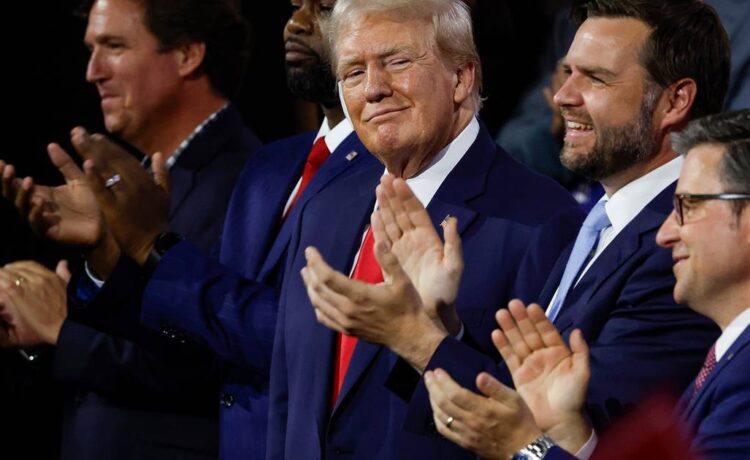Politics have been unfolding over the past few days like we’re in a season finale of Scandal. With an assassination attempt on former President Donald Trump, calls from President Joe Biden’s own party for him to bow out of the race, and a number of prominent Silicon Valley titans starting a Trump super-PAC, investors have had a lot to digest.
And now, many are beginning to forecast what the reality of a second Trump presidency would mean for taxes, trade, and tech policy. While the “Trump trade” helped drive a chipmaker selloff while simultaneously boosting some small caps in domestic markets, the prospect of a November victory for the former president also has serious implications for international investments.
Broadly, Trump’s proposed tariff policy of 10% across the board, which some economists have said would drive up inflation if actually implemented, would hurt already-struggling European stocks.
“We have seen a brutal tech sell-off post Trump comments to the media at the RNC National Convention about stepping up China tariffs and protecting Taiwan from China which catalyzed a Street panic for semis, AI Revolution names, and Big Tech,” wrote Wedbush analyst Dan Ives in a note today. “This is just the appetizer comment heading into Trump’s much anticipated keynote speech tonight at the RNC in which we expect to hear more details around Trump’s broader strategy when dealing with China, tariffs, and Taiwan,” he added.
While China is the focus of these tariffs, it’s not just the Chinese economy that would take a hit. For instance, ASML, a company based in the Netherlands, sold off yesterday on the report that Biden may ramp up tariffs on US goods sold abroad.
Here are where analysts think the biggest impacts of a “Trump trade” will be across the pond.
- Higher tariffs means slower growth in Europe. “For Europe, the prime concern is tariffs,” wrote Goldman Sachs analyst Sharon Bell in a recent note. “Trump has pledged to impose a 10% tariff on all US imports. Our economists estimate it could take out 1 percentage point from the Euro area and 0.5 percentage points from US GDP.” Bell added that each 1 percentage point drop in sales-weighted GDP results in 10% drop in earnings per share.
- The impact of tariffs would be worse in Germany, due to the German economy’s reliance on industrial activity, while it wouldn’t be as bad for economies like Spain and the UK.
- Companies with high Chinese exposure could feel the pain. “We do see some downside risks to the capex outlook for companies with particularly high exposure to China if Mr. Trump wins the election and his new administration follows through on proposals to sharply raise tariffs on imports from China,” wrote Goldman Sachs Chief Economist Jan Hatzius in a separate note.
Making sense of market moves
Stay up to date on the latest market news with daily analysis of the investing landscape, served up Brew-style.
How should you prepare your portfolio for the “Trump trade”?
A lot of policy predictions are just that—predictions. And if there’s one thing that we all know for sure, it’s that many campaign promises never actually go into effect.
“There is uncertainty about the election outcome and any policy implementation,” wrote Bell. “We have not adjusted our forecast nor recommendations. That said, several of our recommendations could benefit from a Trump re-election scenario.”
Here are some of the European investments that would rise on a second Trump presidency, according to Goldman Sachs:
- “We are overweight healthcare, telecoms and media publishers,” Bell wrote. “We recently re-initiated a long on Europe Defense.”
- Bell also noted that she’s bullish on European companies exposed to the US, while she’s shorting European companies exposed to China.
- “Defensives such as Utilities, Healthcare or our GRANOLAS tend to be the main (relative) beneficiaries of trade risk rising, whereas Cyclicals – Autos, Industrials and Financials – tend to be negatively correlated to trade uncertainty,” Bell wrote.
“GRANOLAS,” FYI, is Goldman Sachs’ fun acronym for the European companies GSK, Roche, ASML, Nestle, Novartis, Novo Nordisk, L’Oreal, LVMH, Astrazeneca, SAP, and Sanofi.—LB












